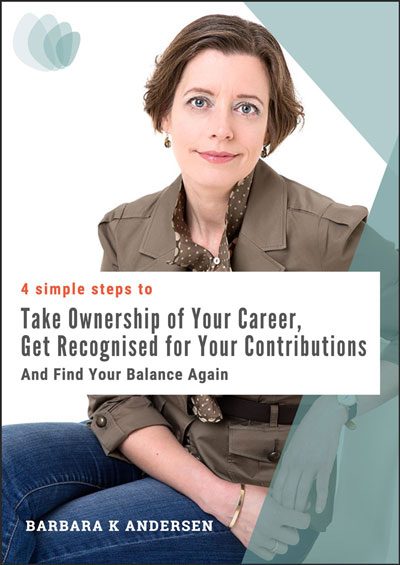Happy UN Career Podcast / Episode 16
What Will Your UN Career Look Like 10 Years from Now?
Episode 16 / 10 March 2021
SHOW NOTES
Welcome to this 5th episode in a small series I’ve called: “Professional Development – Job Hunting and Your CV”.
In the previous episode, I talked about how to use all the work you have to do anyway for your annual performance review to fuel your own work on your career development. You can find that episode at www.barbarakandersen.com/15.
In today’s episode, I want you to take a longer view of your career. You could say that we’re going to have a look into the crystal ball!
I want you to think about what your CV will look like in 10 years.
Where will you be? And what do you want your CV to look like? What do you want it to reflect about your professional life?
Do you have a plan? Or do you prefer to wait and see what happens?
I’ve noticed three different ways of approaching career planning:
- There is no plan – one day simply follows the other. You show up, do your job and hope for the best.
- You have a clear plan and vision for your career. First this kind of job, then that kind of job. Always preparing for the next step.
- You have dreams, but not really a plan. Apart from your education, you probably haven’t taken major action to drive yourself toward a clearly defined goal. It feels more like you have navigated the flow and the possibilities that showed up.
In my experience, the third group is the biggest.
And this was also how I handled things for many years.
I always felt lucky when I got a job. Then I worked hard to do that job as well as I could. I realised what I liked and didn’t like about it. But I was very much flowing with the opportunities that showed up.
I can see now that I was more reactive than proactive in my career back then.
Maybe you recognize this scenario?
You got the job. You learned to do the job. Learned from the job. Settled in. Got comfortable with the job. Then, slowly you got a bit tired of the job or the content of the job – or the general setting you were in.
Slowly you started to think about “what else?” What could be interesting? Where could I go?
So, maybe you don’t really have a plan. But the truth is that if you dare ask yourself, there are things that you’d like to see happen for yourself.
Maybe you’ve had that question in a job interview: “Where do you see yourself five years from now?” Was it easy to respond to? And have you acted on it?
Many of us hope that opportunities will show up. However, experience has shown me that hope is not really a strategy.
I don’t believe we can decide or predict exactly what will happen five or 10 years from now. But we can envision what we’d like our professional life to look like. And we can take action to move in that direction.
Is there a 4th way?
So, your CV is essentially a shorthand version of your career. Is that something that is happening to you? Or are you setting the direction?
Are you proactive or reactive?
If you want to become more proactive, that doesn’t mean that you have to – or should – plan everything in great detail. Not at all, actually. But the first essential step is to become aware of what direction you want to go in.
4 reasons we’re not doing it already:
- A simple lack of awareness. Not understanding how this can help us.
Despite all the social medial posts we see about goal setting and “you can do it” – most of us haven’t really learned how to “do it”. We don’t really trust that we can take charge. - Day-to-day work, the endless meetings, the bottomless inbox. The to-do list takes over and your own agenda takes a backseat …
This is due to “present bias”. An interesting concept which means that we focus on what’s most overwhelming right now. For example, work obligations!
And because we’re biased to focus on the to-do list for today, we fail to prioritise and take the time to deal with long term planning, strategy. This is actually a huge issue for our daily work responsibilities – and also for our career development.
- We’re missing a process – something that prompts us to get started.
- Fear! It can actually be a bit daunting to look into the future and hold yourself accountable for moving in a certain direction.
When you start acting, really thinking about your dreams and wishes, realising what you want – then you might also become aware that there is a risk of things not going exactly as you want them to.
And in order to escape a possible future disappointment, we sometimes avoid taking decisive action in the first place.
But don’t be afraid. The wins of this process far outweigh the possible losses!
5 things to consider for your UN Career in the future
#1 10 years from now, where you’re at, timewise, in your career?
- Are you just getting started right now and will have reached your mid-thirties by then?
- Or will you be midways in your career?
- Will you be nearing retirement? Or will you have retired?
#2 – What are your ambitions, your dreams and values?
- Is it important for you to stay on a fixed-term contract – or to get one?
- Or is more important for you to have the flexibility to move between jobs and organisations?
- Would you like to rise in the ranks? Develop yourself further as a manager, a leader? Do you want more authority?
- Or are you more interested in developing your technical expertise? Maybe you really don’t want managerial responsibilities!
- Is it important for you to get new and different work and life experiences?
#3 – What kind of experience will be important for you to look back upon 10 years from now?
- Is it mostly about the people you work with? The relations and interactions?
- To have been part of exciting projects?
- Is it about having made the biggest possible impact?
- Or would you like to teach and show others? Help colleagues grow and succeed?
- To learn new things yourself?
- To feel that you have fun at work? Or
- For you to feel that you really make an effort – and a difference?
#4 – What kind of image suits your idea of your career?
- Do you see your career as a ladder you’re climbing?
- Or is it more like a winding road where the endpoint disappears in the horizon?
- Or could it be a roundabout with different roads you can take? You can go down one road and then come back and try another?
#5 – How do you want to feel? (Don’t be mistaken – everything that drives us in this world is really about feelings!)
- When you’re at work?
- About your colleagues?
- About your manager?
- About your tasks?
- When you wake up Monday morning to begin a new work week?
- When you go home every day – and leave work?
- When you retire?
So in essence you could say:
- Think not only of your title, grade and level
- Think of the job content, and
- How you feel at work. What makes you enjoy your work and your workday?
- And what is it important for you to have time for outside work?
How to get started:
- Make a plan and set aside dedicated time.
- Get out pen, paper and some coloured markers – and dare yourself to be a bit creative. But don’t overcomplicate it! A small, simple step is better than no step.
- Get support. Some people will easily do this on their own, but most of us will do better with help. Having your thinking challenged a bit. Maybe you have a good colleague or friend who would like to share in the exercise.
And if you can feel that this is a sore point for you, maybe it’s worth considering getting professional support.
- If you did the Career Journey exercise from episode 4, go back and look at your notes from that. They’ll come in extremely helpful here. In the Career Journey exercise, you visualise everything you’ve done in your career. What did you enjoy? What were the highs and the lows?
If you haven’t done the exercise or haven’t listened to that episode yet, I suggest you press pause right now and go back and listen to that at www.barbarakandersen.com/4 – and then come back and continue here afterward.
- Make sure that you come out with an image of what things will look like. In reality, it probably won’t look exactly like this in 10 years, but the image will help you today. Because how can you plan for your dream if you can’t envision it?
- Now, think about: in order to arrive at that place 10 years from now. What will you do? Where do you need to be, say 8 years from now, 5 years from now? Or 3 years from now?
- And what are the first steps you can take now and in the coming year?
I wish you lots of luck with creating a vision of your CV 10 years from today.
Think about:
What is the first small thing, you want to take action on in bringing yourself closer to the professional life you want to have?
What’s the Next Step?
Now we’ve spent some time speaking of things that required some big words. Visions. Dreams. Values. What fulfills you in your work and life, etc.
An important element in succeeding with all of this is your ability to make your plans and dreams concrete. And take action.
So, in the next episode, we’ll look at simple and concrete tips for planning and – maybe even more importantly – prioritization.
In other words, how do you become effective in doing the things you really want to do?
Which will also help you become effective with all the other things you have on your plate.
Stay tuned!




